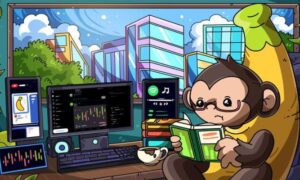Frank (not his real name) told me he had done his analysis on a certain US stock and decided that despite its popularity it didn’t warrant entry from his own process of trade analysis. But his Discord group was pushing its members to get it. He felt these confident traders must know what they are talking about so he entered the trade, and indeed it did what he thought it would do and he lost.
FOMO is a massive fear in trading and describes the situation where you enter a trade despite the fact that you have not done enough analysis or don’t have your own views on the asset but because people around you, either in the market or people you know, have entered the trade, you feel compelled to do so.
This is a compulsion often and even if your mind knows that you are not ready or sure enough to enter the trade you may still feel a great pull to enter the trade anyway.
Despite there being a single and simple way of describing the problem, through my years of trading psychology coaching I have found that there are several causes for this which can often be quite different from each other.
Using the five step process outlined in the best trading psychology book, I have worked with many cases of FOMO and here are some of the reasons I have found that people have suffered from it.
Fear of rejection. So the first thing we need to answer is, so what if you miss out? What are you really scared of? For some traders it is the fear of rejection, of not being part of the group. If they get seen as not doing what everyone else is doing, they fear they might not belong to the group and that is as scary as death for them.
If we go into the deep root cause of what is going here, often there is a primal fear of rejection that comes from an early stage in childhood. There is a fear that there is a real chance that you will be abandoned, and therefore rejected. In primal times, being abandoned or rejected or exiled was essentially a death sentence where you couldn’t rely on the tribe and so had no support for food and shelter. There was no society, in fact the tribe was society, so it is the modern equivalent of being exiled to live in a jungle or desert with no human support. Thus, whoever has this primal fear will treat being rejected as akin to a death sentence and all the fear that comes with that. I would say that I in fact suffer from this fear often, but given the processes I know and use, this fear does not affect my functioning in the world.
This may all seem far away from the facts of placing trades to make some money but I have spoken with many people with the fear hidden and underlying and while it may seem remote, the fear of rejection and dying is powerful and explains the strange behaviours once you can look under the surface using the five step process. As a side note, people who have this as a core fear are often people who were actually abandoned, or felt abandoned, as a child. It could be someone like Steve Jobs who was adopted, or someone whose parents were too busy to nurture them directly when they were very young, which can happen in very poor families but also in very wealthy families too.
Not trusting yourself. The trader may have done their analysis and understand why they do not want to enter the trade but when more “senior” traders enter the trade they may doubt themselves and enter the trade. Or if they see the market entering, before working out why the market is doing it, they trust the other traders more than themselves and then do not enter the trade.
This type of person feels unsafe and insecure and are defined by their desire for safety and security. They prioritise anticipating and avoiding risk, and putting themselves with trustworthy authority figure. Alert and vigilant, traders with the belief of “I don’t trust myself” are always thinking several steps ahead to anticipate and prepare for what could go wrong. Which might seem like good risk management and it is on the surface. But because the mistrust happens at a deep level, there is no amount of evidence that can overcome this deep belief. So it can become so insecure that the trader rapidly doubts their own analysis when a more authoritative figure comes along and tells them what to do, at which point they shed their own ideas and follow the guru’s trade for fear of missing out.
nce we revived Frank’s self trust, he either ignored the Discord group or just used their views are data but always came up with his own reasons for trading.



































